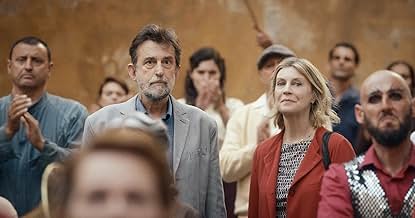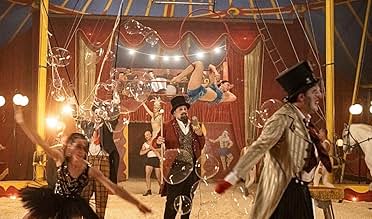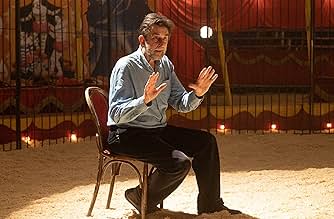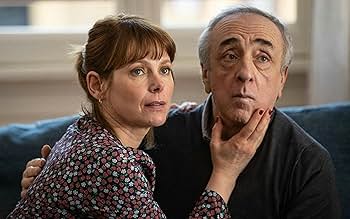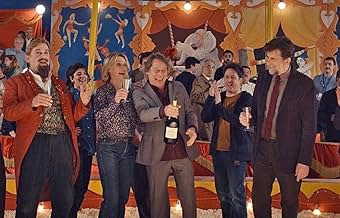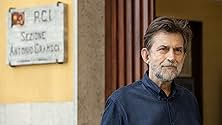NOTE IMDb
6,7/10
3,8 k
MA NOTE
Dans un contexte de mille incertitudes, Giovanni réalise un film sur la vie d'un intellectuel communiste en 1956, date fatale de l'invasion de la Hongrie par l'Union soviétique. Pendant ce t... Tout lireDans un contexte de mille incertitudes, Giovanni réalise un film sur la vie d'un intellectuel communiste en 1956, date fatale de l'invasion de la Hongrie par l'Union soviétique. Pendant ce temps, son mariage traverse une crise.Dans un contexte de mille incertitudes, Giovanni réalise un film sur la vie d'un intellectuel communiste en 1956, date fatale de l'invasion de la Hongrie par l'Union soviétique. Pendant ce temps, son mariage traverse une crise.
- Réalisation
- Scénario
- Casting principal
- Récompenses
- 2 victoires et 21 nominations au total
Avis à la une
A film that's different from the usual, almost a metafilm into which other films are interwoven. Moretti talks to us about history, politics, love, violence, and physical decay. In some ways, it's also very autobiographical. Despite the many themes the director has inserted, everything flows smoothly towards an ending that leaves some threads of hope for the audience. I left the cinema feeling happy, despite everything. For this, I want to thank Moretti. At some point, it wasn't so obvious. The actors' performances were also great, especially those of Silvio Orlando and Margherita Buy, as well as Amalric's. In short, it's the usual Moretti film that never disappoints and I believe can be appreciated not only by an Italian audience but also an international one.
I didn't like this movie at all. Perhaps this was a movie for die hard Moretti fans that saw all his movies? For me the story was very weak, the pace was utterly slow and clearly they should prohibit certain directors to act in their own movies. There were some nice shots and sure I could smile a few times. I guess a metafilm can work, but I couldn't relate to neither one of the stories and both of the stories were quite superficial and unexciting. In short: I agree with the reviewer of the gardian who writes: "I'm sure the future will be brightened by another, better Moretti film - this one is best forgotten."
Someone asked me one day which person in history I would want to have lunch with. While Julius Caesar, Jesus Christ, Napoleon or George Washington may have been good candidates, I couldn't think of a name that appealed more to me than Nanni Moretti. Over the last 25 years, starting with the exceptional Palombella Rossa, Nanni Moretti has had an uninterrupted streak of masterpieces including Caro Diario, The Son's Room, The Caiman, We Have a Pope, Mia Madre and Three Floors, to name a few, which rank among the best films made in that time period, and make Nanni Moretti one of the greatest living filmmakers.
With that track record, I imagine Moretti could only disappoint. And disappoint he does with A Brighter Tomorrow. Don't get me wrong, we are still talking about one of the best filmmakers in the world, one that certainly knows how to make a good movie. But this one feels miles behind his other films. One of the things that hit you is how self-referential it is. From the name of the circus in the film (Budavari, a reference to Palombella Rossa) to the obsession with shoes (a reference to his earlier films, in particular Bianca) to a scene playing with a soccer ball (a reference to Caro Diario), it feels reheated, almost vain, from a filmmaker who always looked decidedly into the future. And this feeling of lack of ideas is made worse by abundant references to classic films, in particular those of Fellini.
In a way, these shortcomings arise from the subject of the film itself: it is ultimately about the gap between Moretti's values, represented by his films and his film culture, and today's world. But the issue is the message feels conveyed without passion, which has been the one constant in his filmography to this day. A Brighter Tomorrow therefore disappoints. We can only hope for Moretti's next film and remember all of his previous ones.
With that track record, I imagine Moretti could only disappoint. And disappoint he does with A Brighter Tomorrow. Don't get me wrong, we are still talking about one of the best filmmakers in the world, one that certainly knows how to make a good movie. But this one feels miles behind his other films. One of the things that hit you is how self-referential it is. From the name of the circus in the film (Budavari, a reference to Palombella Rossa) to the obsession with shoes (a reference to his earlier films, in particular Bianca) to a scene playing with a soccer ball (a reference to Caro Diario), it feels reheated, almost vain, from a filmmaker who always looked decidedly into the future. And this feeling of lack of ideas is made worse by abundant references to classic films, in particular those of Fellini.
In a way, these shortcomings arise from the subject of the film itself: it is ultimately about the gap between Moretti's values, represented by his films and his film culture, and today's world. But the issue is the message feels conveyed without passion, which has been the one constant in his filmography to this day. A Brighter Tomorrow therefore disappoints. We can only hope for Moretti's next film and remember all of his previous ones.
A Brighter Tomorrow, directed by Nanni Moretti, is a deeply introspective work that grapples with the challenges of aging, personal relationships, and the fading ideals of the past. The film weaves a meta-narrative as Moretti portrays a filmmaker struggling to complete a movie about the Italian Communist Party during the USSR invasion of Hungary in 1956, while also navigating the complexities of his personal life.
Moretti's performance is poignant, as he channels his characteristic wit and self-awareness to reflect on the inevitability of change. Margherita Buy and Silvio Orlando deliver nuanced portrayals, adding depth to the story's emotional layers. The interplay between Moretti's fictional and real-life personas creates a dialogue with the audience, blending humor and melancholy in a way that feels uniquely his own.
The film excels in its quieter moments, such as a scene where a reluctant young couple watches *La Dolce Vita*, a symbolic nod to the contrasts between generational attitudes. Moretti resists succumbing to nostalgia, instead embracing a tempered optimism that acknowledges the wounds of the past while looking toward the future. The sun may continue to rise, but it does so over landscapes marked by the scars of time.
A Brighter Tomorrow is not without its flaws-some viewers may find its self-referential approach too insular-but it remains a compelling exploration of resilience and the enduring power of art and connection.
Rating: 8/10 - A thoughtful and bittersweet meditation on change and perseverance.
Moretti's performance is poignant, as he channels his characteristic wit and self-awareness to reflect on the inevitability of change. Margherita Buy and Silvio Orlando deliver nuanced portrayals, adding depth to the story's emotional layers. The interplay between Moretti's fictional and real-life personas creates a dialogue with the audience, blending humor and melancholy in a way that feels uniquely his own.
The film excels in its quieter moments, such as a scene where a reluctant young couple watches *La Dolce Vita*, a symbolic nod to the contrasts between generational attitudes. Moretti resists succumbing to nostalgia, instead embracing a tempered optimism that acknowledges the wounds of the past while looking toward the future. The sun may continue to rise, but it does so over landscapes marked by the scars of time.
A Brighter Tomorrow is not without its flaws-some viewers may find its self-referential approach too insular-but it remains a compelling exploration of resilience and the enduring power of art and connection.
Rating: 8/10 - A thoughtful and bittersweet meditation on change and perseverance.
#Cannes2023# A film by a white old male director that far exceeded my expectations. It can be considered as a self-reflection and self-deprecating work from the usually narcissistic Moretti. He directed and acted in a movie that explores his journey from denial to ultimately admitting his creative decline, the irrelevance of his themes (at least to a diminishing audience), his inability to work without his wife "assistant" and the growing resentment from his crew towards his mansplaining . In the end, he also concludes with a false sense of hope, summarizing it as a lament for the leftist movements of the 1950s and acknowledging his inability to find a good ending. This self-analysis and sincere display of vulnerability moved me. There are countless directors in their old ages who have run out of creative juices, but not many can be this candid. Additionally, there are Fellini-esque elements throughout the film, with circus motifs and ensemble dancing, adding a touch of delightful nostalgia. @ Cannes Cineum Aurore.
Le saviez-vous
- AnecdotesSelected to compete for the Palme d'or in the 2023 Cannes Film Festival. This is the ninth time that a film from director Nanni Moretti is selected at Cannes; every movie he made since "Caro diario" has been at Cannes, he even won the Palme d'or in 2001 with "The Son's Room."
- ConnexionsFeatures La dolce vita (1960)
Meilleurs choix
Connectez-vous pour évaluer et suivre la liste de favoris afin de recevoir des recommandations personnalisées
- How long is A Brighter Tomorrow?Alimenté par Alexa
Détails
- Date de sortie
- Pays d’origine
- Langues
- Aussi connu sous le nom de
- A Brighter Tomorrow
- Lieux de tournage
- Sociétés de production
- Voir plus de crédits d'entreprise sur IMDbPro
Box-office
- Budget
- 12 284 110 € (estimé)
- Montant brut mondial
- 6 668 544 $US
- Durée1 heure 35 minutes
- Couleur
- Rapport de forme
- 1.85 : 1
Contribuer à cette page
Suggérer une modification ou ajouter du contenu manquant

![Regarder Trailer [OV]](https://m.media-amazon.com/images/M/MV5BZjUxOGY3NjUtN2RiNy00NDlkLWE4MGYtZjkxMTU2MmNmOTBmXkEyXkFqcGdeQXRyYW5zY29kZS13b3JrZmxvdw@@._V1_QL75_UX500_CR0)

